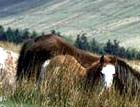Uplands under threat
In a new document published today, the RSPB calls for action to prevent upland decline


The uplands, which cover 40 per cent of the UK's land area and gather 70 per cent of our drinking water, are in rapid decline, according to the Royal Society for the Protection of Birds. Today, it publishes a new document, 'The Uplands ? Time to Change?' to highlight the damage caused by bad land management, water management issues and poor woodland condition.
The population of the Black Grouse, for example, has fallen by 22 per cent in the past 10 years, because of habitat degredation caused by heavy grazing by sheep and deer reducing tall vegetation shelter and drainage systems removing the insects that are vital for chicks for feed on. However, the RSPB believes that population decline could be reversed if grazing intensity was reduced, a mixture of habitats were provided, and some areas were allowed to re-hydrate.
The RSPB also points to the case study of the Lake District, which has seen a 57 per cent decline in butterfly species between 1995 and 2004, and a 63 per cent decline in lapwings over the past 20 years. The National Park is currently suffering from problems including soil erosion, inappropriate flood defences and loss of natural tree line ? all of which can be worked on to help prevent additional damage form the Park's 12 million visitors each year.
Environmental threats from upland decline are also raised, with the document quoting the estimate that peatlands in England and Wales can absorb up to 41,000 tonnes of carbon each year if in pristine condition; or release 381,000 tonnes of carbon if damaged by excessive burning, drainage and overgrazing.
So, what next? You are invited to join the debate on the future of the upland areas by emailing uplands@rspb.org.uk, or visiting the RSPB website; Gordon Brown has said that 'Advancing and protecting the British way of life means taking seriously the stewardship of our environment and countryside,' and the Government-backed UK Diversity Action Plan for upland areas has several objectives, including achieving favourable condition on all upland heathland Sites of Special Scientific Interest/Areas of Special Scientific Interest by 2010.
RSPB Scotland has also set up two inquiries: The Royal Society of Edinburgh's Inquiry into the Future of Scotland's Hills and Islands, and the Crofting Inquiry, led by Mark Shucksmith.
Exquisite houses, the beauty of Nature, and how to get the most from your life, straight to your inbox.
Country Life is unlike any other magazine: the only glossy weekly on the newsstand and the only magazine that has been guest-edited by His Majesty The King not once, but twice. It is a celebration of modern rural life and all its diverse joys and pleasures — that was first published in Queen Victoria's Diamond Jubilee year. Our eclectic mixture of witty and informative content — from the most up-to-date property news and commentary and a coveted glimpse inside some of the UK's best houses and gardens, to gardening, the arts and interior design, written by experts in their field — still cannot be found in print or online, anywhere else.
